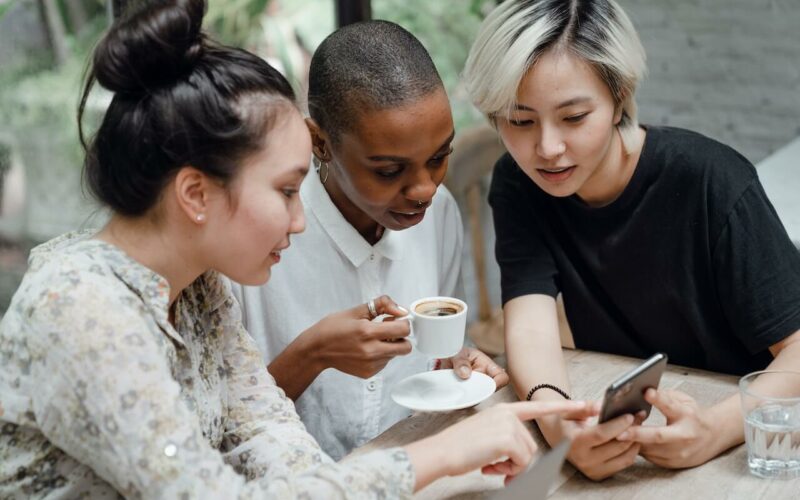In 2020, more than 2.9 million Asian Americans reported experiencing mental health issues. Unfortunately, mental health stigmas and barriers to treatment have kept many of them from getting the help they need. A National Alliance for Mental Illness survey found that 77% of Asian Americans with mood disorders struggle to talk about their symptoms with others.
Various research suggests people in the Asian Americans community are less likely to take action on mental health issues, but there are ways to overcome these problems and increase access to care. Learning more about AAPI mental health and discovering resources is an excellent first step.
Common Issues That Impact Asian American Mental Health
There are many mental health concerns facing the AAPI community. In addition to common everyday stressors like significant life changes, basic anxiety, types of depression, relationship problems, and a lack of sleep, Asian Americans might also struggle with racial discrimination, stereotypes, and other concerns. These are just a few factors contributing to Asian American mental health issues.
Discrimination & hate crimes
The Center for the Study of Hate and Extremism found that anti-Asian hate crimes increased by more than an astounding 339% in 2021. This surge of attacks and discriminatory behavior has caused many people to experience a decline in mental health. In a recent survey, 42% of Asian Americans said that racial discrimination is the issue that has the most significant impact on their mental health.
Model minority myth
Misconceptions about model minorities have been damaging to many Asian Americans. The model minority myth describes when a blanket statement or assumption is made about an entire group or community.
For example, one minority myth relates to people in the Asian community having superior intelligence. Unfortunately, if someone internalizes these myths, they can often feel increased pressure to succeed, potentially damaging their mental health and psyche. These beliefs can negatively impact self-esteem and cause people to feel inferior to others.
Family pressure & expectations
Collectivist values are common in Asian communities. Although these values can lead to strong family bonds, they can also create high expectations. People who struggle to live up to these expectations may experience types of stress. Some might feel pressured to hide mental health symptoms to avoid disappointing family members.
“Due to the collective nature of the Asian communities, there’s a high price on making sure that personal or family issues are not divulged to others within the community. ‘Saving face’ is the idea that family/individual issues stay private for fear of losing standing within the community. It is one of the deterrents for many Asian Americans not to seek mental health help. The fear of being ostracized from the community can be so great that family members will discourage or shame an individual from speaking out.”
– Talkspace therapist Minkyung Chung, MS, LMHC.
Racial stereotypes
Racial stereotypes can cause Asian Americans to feel diminished or like their accomplishments aren’t being recognized. Stereotypes can also reinforce unhealthy cultural expectations, making it more difficult for people to seek support and can even cause people to develop racial trauma. While negative stereotypes are clearly damaging, even those that are seemingly positive can negatively affect a person’s mental health.
Racial imposter syndrome
Racial imposter syndrome causes people to feel like their true self doesn’t match other people’s perceptions of their racial identity. As a result, many Asian Americans feel they have to hide aspects of their culture to fit in. Experiencing racial imposter syndrome puts people at increased risk for depression and anxiety.
Barriers to Improving Asian American Mental Health
The AAPI community includes individuals from many cultures and nationalities. Despite being a largely diverse group, there are AAPI mental health barriers that many members of the community share. Social stigmas, language barriers, racism, and a lack of cultural competency can make it difficult to obtain mental health care.
The stigma around mental health in Asian cultures
Unfortunately, there are many stigmas surrounding poor mental health in the AANHPI community.
“There lies a host of stigmas and negative perceptions around mental health within the community. Mental health help is often thought to be for those of weak will or mind. Therapy is for the ‘crazy.’ This leads to many Asian Americans being unwilling to admit that they’re in need of mental health services. Working with this population often starts with dispelling the misconceptions of mental health help.”
– Talkspace therapist Minkyung Chung, MS, LMHC.
People might fear showing weakness, or they may worry that asking for help will make them a burden. Mental health issues can also be considered taboo in some cultures, making it even harder for people to bring up symptoms or concerns.
In some Asian communities, people have concerns about saving face. This concept refers to a person’s reputation, dignity, and social standing. Some may fear that acknowledging mental health issues might cause them to “lose face.”
Language barriers
Language can be a considerable barrier to obtaining mental health care. Studies show that language barriers increase the risk of misdiagnosis. Even when someone can communicate with their mental health provider, they might struggle to express the exact issues or specific symptoms they’re experiencing.
“Language barriers don’t only mean the inability to communicate in the dominant language. It also includes vocabulary that may not exist within the particular language. This makes it difficult to discuss different diagnoses as further explanation and workarounds are necessary. Ensuring that the client and therapist understand one another is important. This may mean the use of a translator [not a family member] or thoroughly defining the terms being presented.”
– Talkspace therapist Minkyung Chung, MS, LMHC.
Culturally competent mental health care
Not only do barriers keep many people from seeking treatment, but a lack of cultural competency can keep people from continuing care.
“Most Asian Americans who start mental health services end up not returning as therapists often don’t take into account cultural nuisances.”
– Talkspace therapist Minkyung Chung, MS, LMHC.
When mental health professionals are unfamiliar with Asian cultures, they may be unable to provide helpful feedback or advice. Asian Americans are significantly underrepresented in the mental health field, which is a major contributor to cultural incompetence.
“For instance, suggesting that the Asian American client confront their elders over an issue may come off as tone-deaf as there’s a high regard/respect placed for elders. It’s important to consider cultural expectations and beliefs when considering treatment plans.”
– Talkspace therapist Minkyung Chung, MS, LMHC.
Mental Health Resources for Asian Americans
Even though there are many challenges facing the Asian American community, there are also resources that can make it easier for people to obtain care. When access to mental health care is available, someone can work to understand the relationship between their culture and their mental health.
Culturally competent and accessible therapy
Mental health care that’s more inclusive and accessible means people can overcome barriers and seek help.
“Ensuring that therapists are aware of the different cultures that encompass the identity of Asian Americans is extremely important. Oftentimes, some Asian Americans are forgotten as part of this population. Starting to identify by region encourages inclusivity.”
– Talkspace therapist Minkyung Chung, MS, LMHC.
Online therapy services, for example, might make it easier for members of the AAPI community to find culturally competent mental health professionals who understand their culture and belief systems. In addition, various organizations and groups can help people find mental health services.
“This also means that being knowledgeable about the different Asian American regions and cultural belief systems will be important. Unfortunately, there’s a lack of representation of Asian Americans within the mental health professional community. This can be a barrier for some Asian Americans who are seeking mental health professionals.”
– Talkspace therapist Minkyung Chung, MS, LMHC.
Support groups
Support groups provide opportunities for people to discuss Asian American mental health issues. These groups can be sources of encouragement and advice and might even help you discover resources you were unaware of. If there’s no support group for Asian Americans in your area, you may want to consider joining an online support group.
You can find support groups run by Asian mental health professionals, and The National Alliance on Mental Illness hosts culturally sensitive, peer-led support groups.
Break the Cycle with Talkspace
Stereotypes and stigmas about mental health can make it hard for many Asian Americans to start therapy, even if they struggle with mental health issues. You can overcome these barriers with the help of Talkspace. Talkspace can match you with a culturally competent therapist equipped to help you on your mental health journey.
Sources:
- 2020 National Survey of Drug Use and Health (NSDUH) releases. SAMHSA.gov. https://www.samhsa.gov/data/release/2020-national-survey-drug-use-and-health-nsduh-releases. Accessed October 26, 2022.
- Communities of Color Face Greater Challenges Finding Effective Therapy, National Survey Finds. NAMI. https://www.nami.org/Press-Media/Press-Releases/2021. Published October 5, 2021. Accessed October 26, 2022.
- Center for the study of hate and extremism. CSUSB. https://www.csusb.edu/hate-and-extremism-center. Accessed October 26, 2022.
- Gerzema J. Harris poll COVID-19 tracker wave 70. The Harris Poll. https://theharrispoll.com/briefs/covid-19-tracker-wave-70/. Published June 30, 2021. Accessed October 26, 2022.
- Bernard DL, Lige QM, Willis HA, Sosoo EE, Neblett EW. Impostor phenomenon and mental health: The influence of racial discrimination and gender. Journal of Counseling Psychology. 2017;64(2):155-166. doi:10.1037/cou0000197. https://pubmed.ncbi.nlm.nih.gov/28182493/. Accessed October 26, 2022.
- Masland MC, Lou C, Snowden L. Use of communication technologies to cost-effectively increase the availability of interpretation services in healthcare settings. Telemedicine and e-Health. 2010;16(6):739-745. doi:10.1089/tmj.2009.0186. https://www.ncbi.nlm.nih.gov/pmc/articles/PMC2992399/. Accessed October 26, 2022.
- 2007-16: Demographics of the U.S. psychology workforce. American Psychological Association. https://www.apa.org/workforce/publications/16-demographics. Accessed October 31, 2022.
- Support groups. NAMI. https://www.nami.org/Support-Education/Support-Groups. Accessed October 26, 2022.
Talkspace articles are written by experienced mental health-wellness contributors; they are grounded in scientific research and evidence-based practices. Articles are extensively reviewed by our team of clinical experts (therapists and psychiatrists of various specialties) to ensure content is accurate and on par with current industry standards.
Our goal at Talkspace is to provide the most up-to-date, valuable, and objective information on mental health-related topics in order to help readers make informed decisions.
Articles contain trusted third-party sources that are either directly linked to in the text or listed at the bottom to take readers directly to the source.




